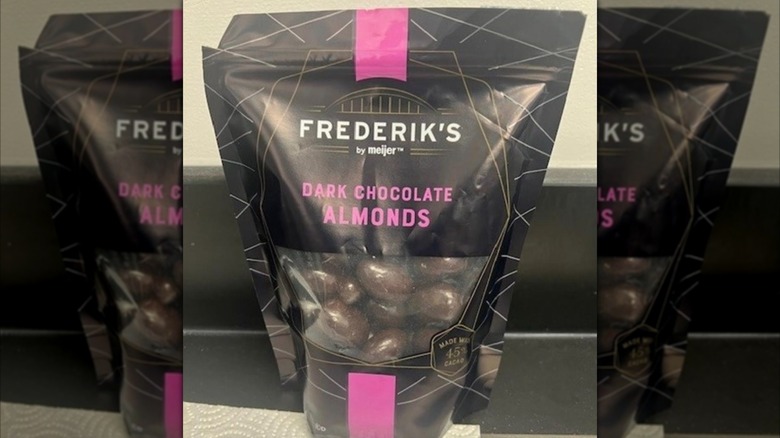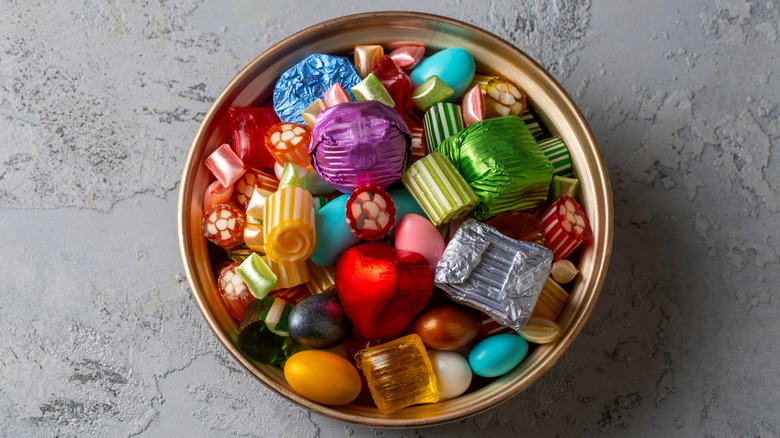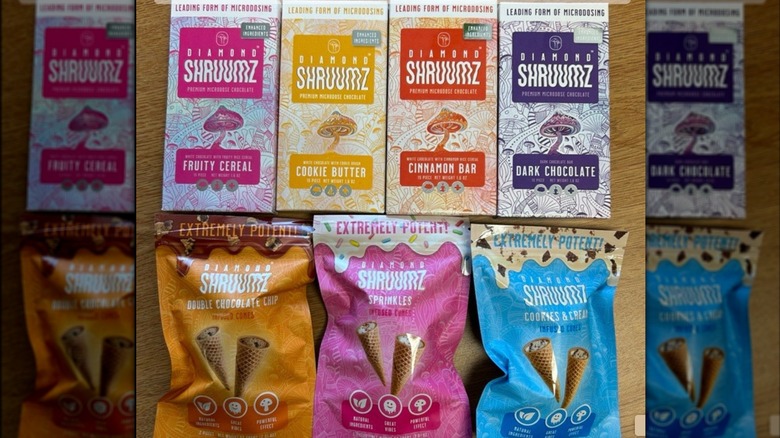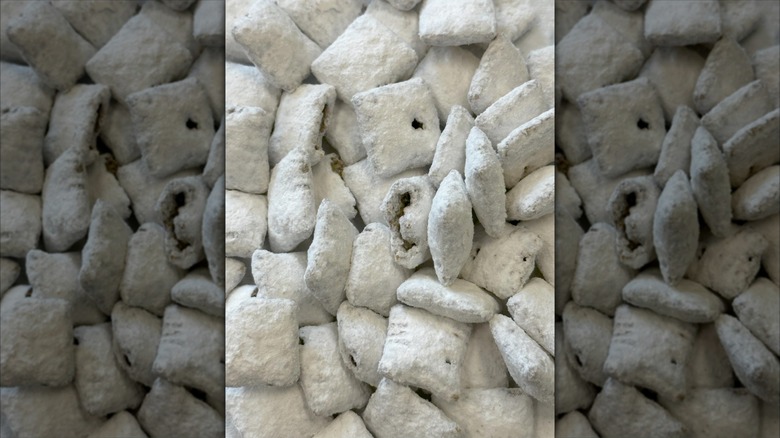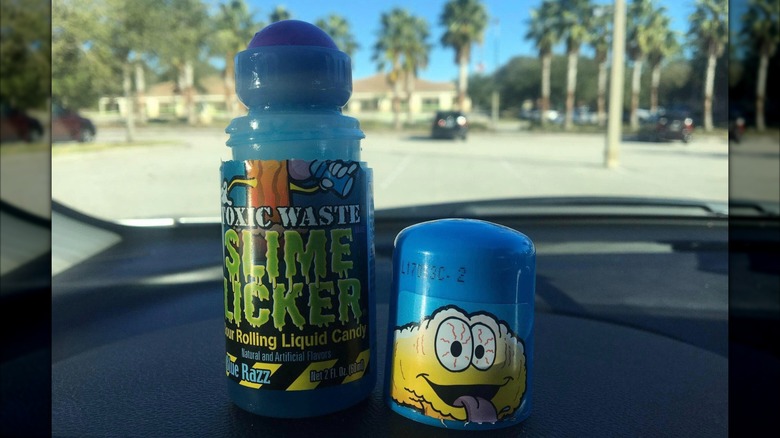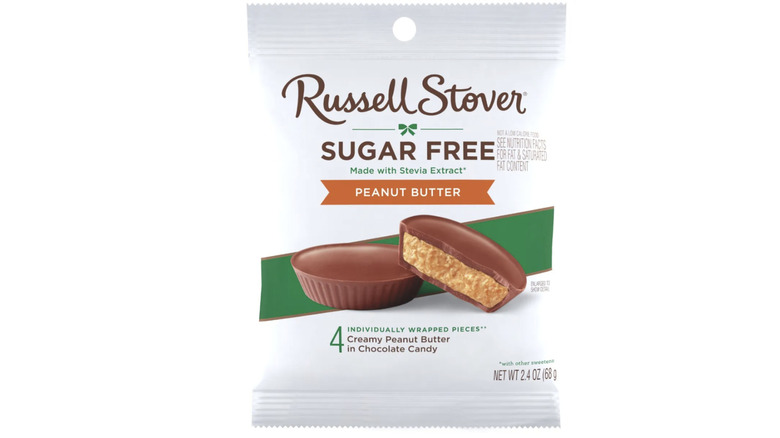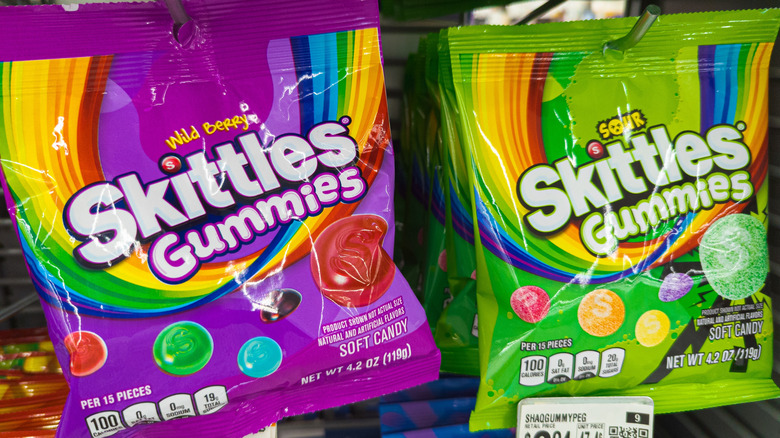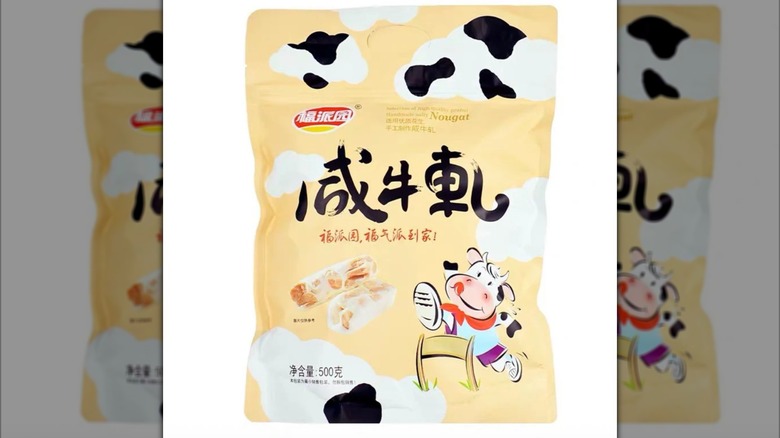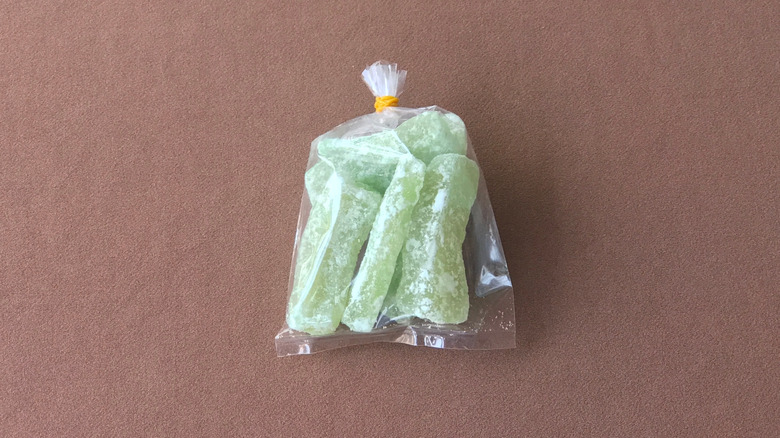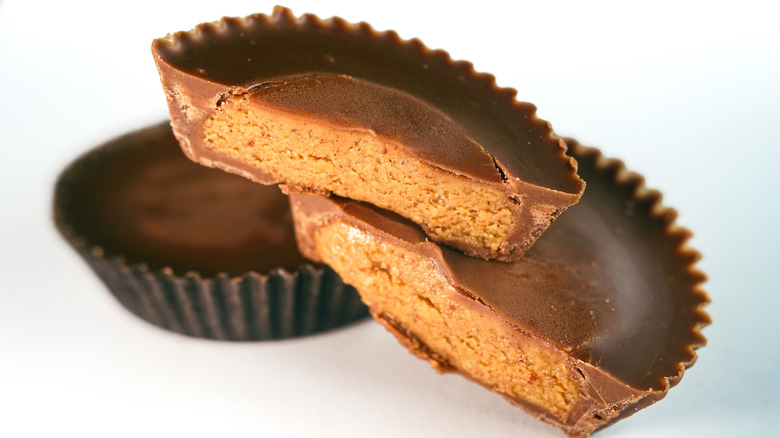Candy Recalls That Affected Millions
Made with sugar or sweeteners and other ingredients such as chocolate, fruit, and nuts, candy comes in a range of textures, flavors, and colors. From chewy gummies and caramels to hard candies like lollipops, confections hold a special appeal that transcends age and, as it turns out, time.
The history of candy dates back to ancient Egypt, where sweet treats were created by caramelizing honey with fruits and nuts. Candy underwent a turning point with the growing availability of sugar in the Middle Ages, although it was still a luxury reserved for the wealthy. By the 17th century, sugar became more accessible, with the first candy appearing in the U.S. in the early 18th century. We can thank the innovations of the Industrial Revolution in the 19th century for ushering in mass production and transforming candy into the everyday treat we know and love today.
But large-scale manufacturing doesn't come without risks. Even small safety lapses can lead to labeling errors and contamination issues. These, in turn, can affect consumers before even being detected. Like most other products on the market, candy has faced its fair share of recalls over the years. Ready to find out more? Here is our breakdown of candy recalls that have impacted millions.
Meijer recalls Frederik's Dark Chocolate Almonds over undeclared cashews (2025)
When it comes to allergens, not all are created equal. While almonds and cashews are both tree nuts — and thus fall under the FDA's definition of major allergens — it still matters which nut is in the product. Some individuals who are not allergic to almonds may be allergic to cashews and vice versa.
This type of product mislabeling is precisely what caused Meijer to recall two sizes of its chocolatey sweet treats in June 2025. Both 12-ounce packs and boxes of eight 1.5-ounce packs of Frederik's by Meijer Dark Chocolate Almonds were affected by the recall. The market withdrawal took place after a customer alerted Meijer that their stand-up pouch of dark chocolate almonds also contained dark chocolate-covered cashews.
While no adverse health effects were reported at the time of the recall, even trace amounts of an allergen — be it a nut or otherwise — can cause allergic responses, ranging from hives and digestive discomfort to potentially fatal anaphylaxis.
Blooming Import recalls Golden Crop Candy due to undeclared and prohibited colors (2025)
The FDA bans certain food dyes because they pose a health risk or are not backed by sufficient research. Even if a food coloring has been permitted for use in products, it needs to be clearly declared on the packaging. In March 2025, New York-based wholesale supplier Blooming Import pulled Golden Crop Candy off grocery store shelves because the treat contained food coloring that was undeclared and, in one case, not permitted for sale in the U.S. The products had been imported from China.
Blooming Import recalled 74 cases of the wrapped candies after finding out that the products contained Blue 1 and Red 40, neither of which was listed on the packaging. The concern was that the synthetic food coloring could pose the risk of adverse reactions in individuals sensitive to the additives. The company also found that the candies contained Acid Red 18, a food coloring that is not approved for use in the U.S. and has been linked to hyperactivity. Golden Crop Candy was sold in Pennsylvania, Maryland, New York, Missouri, New Jersey, Massachusetts, Texas, and Delaware.
The FDA gave the Blooming Import recall a Class II rating, underscoring its relatively serious nature. This classification applies to "a situation in which use of, or exposure to, a violative product may cause temporary or medically reversible adverse health consequences or where the probability of serious adverse health consequences is remote."
Diamond-Shruumz recalls psychoactive candies after reports of illness (2024)
Rather than simply offering a sweet indulgence, Diamond Shruumz products served an entirely different purpose. Classified as edibles, its gummies, cones, and chocolate bars contained substances that had a psychoactive effect. In June 2024, Prophet Premium Blends issued a recall of Diamond Shruumz products after several people who ate them reported falling ill, with symptoms ranging from vomiting and confusion to seizures and loss of consciousness. By October, its edibles were linked to over 100 illnesses, 73 hospitalizations, and three deaths. The products were sold nationally at smoke and vape shops, stores that carry hemp-based products, and online.
Despite the serious nature of the incident, the precise reason why the edibles produced adverse reactions in consumers was never officially confirmed. However, after testing the products, the FDA did confirm that some of them contained muscimol, a psychoactive compound derived from the Amanita muscaria mushrooms, which can be deadly if consumed in excess amounts. Some of the tested products also contained various amounts of acetylpsilocin, psilocin, pregabalin, desmethoxyyangonin, dihydrokavain, kavain, and ibotenic acid.
Clasen Quality Chocolate recalls chocolate products due to salmonella concerns (2024)
Clasen Quality Chocolate's mission is to "be the preferred supplier of safe, high quality chocolate and confectionery coatings through operational excellence" (via Clasen Quality Chocolate). Unfortunately, in June 2024, the company failed to live up to this lofty goal when a wide range of its chocolate-based products were withdrawn from the market due to possible contamination with salmonella.
As far as confectionery recalls go, the Clasen Quality Chocolate incident was relatively large-scale, with more than 4 million pounds of chocolate affected. The suspect products included caramel-flavored confectionery drops, milk chocolate wafers, and milk chocolate-flavored coating. The confectionery was sold in California, Georgia, Iowa, Illinois, Michigan, Ohio, Pennsylvania, Utah, and Washington. The FDA gave the 2024 Clasen Quality Chocolate recall a Class II designation, indicating that eating the product can lead to temporary or medically manageable health issues, with a low likelihood of serious illness.
Palmer Candy Company recalls coated confectionery items due to potential salmonella contamination (2024)
The Palmer family has been in the candy business for five generations, producing a range of sweet treats since 1878. However, its long history and decades of experience didn't prevent a serious quality control lapse. In 2024, the Palmer Candy Company recalled its confectionery products coated in white candy after receiving a notification from a supplier that the dairy powders used to make the liquid coating could harbor salmonella.
The Palmer Candy Company withdrew nearly 30 products from supermarket shelves. These included candy-coated pretzels, fudge cookies, and snack mixes sold in bags, pouches, and tubs at various retailers, including Walmart, HyVee, Target, and Dollar General. Palmer Candy's president and CEO, Marty Palmer, told The Des Moines Register at the time that the nationwide recall affected "many tons of products," adding, "While there is a very, very small chance (of contamination), when you are working with food and safety, 99.9% is not 100%."
While no illnesses were linked to the confectionery at the time, the presence of salmonella in products is a serious cause for concern. In healthy adults, the bacteria can lead to fever, diarrhea, nausea, vomiting, and abdominal pain. These symptoms can be more severe in the elderly, young children, and individuals with compromised immune systems, even leading to death.
Candy Dynamics recalls Toxic Waste Slime Licker rolling liquid candies due to a choking hazard (2023)
The mastermind behind the Toxic Waste brand, Candy Dynamics, has been producing the extreme-flavor candy since 2001. In fact, one of the brand's claims to fame is the production of the world's sourest candy (although whether or not that claim is accurate is up for debate). Despite a loyal fanbase, things didn't go according to plan for Candy Dynamics when it had to recall its Toxic Waste Slime Licker candy — a liquid sweet that came in a plastic bottle with a rolling-ball applicator – in 2023.
Candy Dynamics pulled the novelty candy off the shelves after discovering that the small rolling ball at the top of the bottles posed a choking hazard. In fact, the company received two customer complaints about the ball detaching during use. In total, the company recalled approximately 70 million Slime Lickers in a range of flavors, including strawberry, blue raspberry, apple, and black cherry. The candy was sold at Five Below and Walmart, as well as on Amazon. While the products were distributed in the U.S., they were manufactured in Spain and Colombia.
Russell Stover Chocolates recalls Sugar Free Peanut Butter Cups due to undeclared pecans (2023)
The FDA classifies peanut and tree nut allergens into separate categories, recognizing that they pose unique risks. Since pecans are a tree nut, the ingredient needs to be explicitly declared on product labels in the U.S. to protect consumers from exposure to allergens — regardless of whether the products also contain peanuts.
In 2023, Russell Stover Chocolates found itself in a bind after accidentally selling its Sugar Free Pecan Delights in packages labeled Sugar Free Peanut Butter Cups. The issue arose after a third-party co-packing company mistakenly placed individually wrapped Sugar Free Pecan Delights in outer packaging meant for Sugar Free Peanut Butter Cups.
The public health alarm was issued after a customer notified Russell Stover Chocolates of the blunder. The 2.4-ounce plastic bags of the product had already been shipped to wholesalers and retail stores nationwide. Fortunately, no reports of any adverse health issues were made at the time of the recall.
Brands recall peanut butter candies after a salmonella outbreak (2022)
The 2022 salmonella outbreak demonstrates how just one contaminated ingredient can affect the safety of multiple products across different brands. The problem started at a J.M. Smucker Company's production facility, where traces of salmonella were identified on the peanut roasting production line. It's suspected that this bacteria made its way into Jif peanut butter, making 21 consumers ill and resulting in four hospitalizations.
Unfortunately, before the contamination was discovered, Jif peanut butter was used in a range of confectionery, making this recall one of the most widespread in recent candy history. Shortly after the peanut butter recall was announced, the Euphoria Chocolate Company pulled a range of its products, including Peanut Butter Classic Truffles, Dark Chocolate Peanut Butter Meltaways, and Milk Chocolate Peanut Butter Meltaways. Another company affected by the salmonella outbreak was the Coblentz Chocolate Company, which ended up recalling selected peanut butter confectionery due to safety concerns.
Mars Wrigley recalls gummies due to the presence of metal fragments (2022)
There are many different reasons for product recalls, not all of them involving undeclared ingredients, labeling errors, or harmful pathogens. Sometimes, safety concerns stem from physical contamination with a foreign object. This was the case with Mars Wrigley's 2022 recall, which was initiated after consumers notified the company about finding thin metal fragments in the candy. The company warned that the thin metal strands could be present in the candy or scattered loosely inside the packaging.
The affected products included various types of Mars Wrigley's Skittles Gummies, Starburst Gummies, and Life Savers Gummies. While the candy carried the Mars Wrigley label, it was manufactured by a third party. The popular products were distributed across the U.S., as well as Canada and Mexico. Luckily, no reports of any injuries were received at the time of the recall. At the end of the day, the source of the contamination was never revealed to the public.
Strauss Israel recalls candy and other confectionery due to possible salmonella contamination (2022)
A subsidiary of the Strauss Group, Strauss Israel specializes in the production of confectionery, coffee, dips, and spreads. The Israel-based food and beverage manufacturer is also the mastermind behind various Elite-branded sweet treats. In 2022, Strauss Israel issued a recall of its Elite confectionery on the kosher market in the U.S. due to potential contamination with salmonella. While the products were distributed nationwide, the main states affected by the recall were New York, New Jersey, Connecticut, California, and Florida.
All in all, Strauss Israel ended up withdrawing over 100 confectionery products from the market, including Elite Chocolate Button Shaped Candies, Elite Milk Chocolate with Hazelnut Pieces, and Elite Strawberry Flavored Toffee. The salmonella safety alert didn't affect any of the company's Elite coffee products. The confectionery was recalled after salmonella was discovered on the company's production line and in the liquid chocolate used in the products.
The fiasco resulted in the closure of Strauss Israel's Nof Hagalil plant in northern Israel, where the confectionery was produced. The factory was reopened months later "after significant investments were made to ensure the quality and safety of the products" (via The Times of Israel). While the Elite brand recall was already sizable in the U.S., the contamination prompted one of the largest food recalls on record in Israel, with at least six hospitalizations.
Rong Shing recalls nougat candies because of undeclared eggs and milk (2019)
Rong Shing really dropped the ball in 2019, issuing two mislabeling recalls for two separate nougat candies within two months. In September, the Brooklyn-based company pulled FuPaiYuan Nougat candy from supermarket shelves after it was discovered that the product contained milk and egg — both ingredients not listed on the product's label. The following month, Rong Shing announced that it was recalling its Glam Day Nougat candy because it once again contained undeclared milk and egg. Both cases came to light after routine testing by the New York State Department of Agriculture and Markets Food Inspectors.
The FDA has classified milk and eggs as two of the nine major allergens, alongside fish, shellfish, tree nuts, peanuts, wheat, soybeans, and sesame. While harmless to most consumers, both have the potential to trigger allergic reactions in sensitive individuals. Ranging from mild to severe, these reactions can include hives, digestive issues, or, in some rare cases, even life-threatening anaphylaxis.
Fine Land Corp recalls Meiqili Durian Candy due to undeclared milk allergen (2018)
For those not in the know, durian is a large, tropical fruit known for its spiky outer shell and pulpy, yellow inner. The fruit is also famous for its sharp, pungent smell. While you are unlikely to find durian at your local supermarket, you might just be able to get your hands on durian candy. In 2018, Meiqili Durian Candy became the subject of a food safety alert after it was revealed that the product contained an unlisted ingredient — milk. Listed as one of the FDA's nine major allergens, milk can pose a serious health risk for individuals with allergies.
Fine Land Corp's Meiqili Durian Candy was imported from China and shipped to grocery stores in Connecticut, New York, Philadelphia, Boston, Virginia, and Maryland. The undeclared allergen was first brought to the company's attention after it was identified during standard testing by the New York State Department of Agriculture and Markets Food Inspectors.
SLR Food Distribution recalls Sugar Melon Candy due to undeclared sulfites (2018)
Founded in 2008, SLR Food Distribution is a New York‑based importer and wholesaler of specialty Asian grocery products, such as candy, dried fruit, grains, noodles, beans, and spices. In 2018, the company found itself in a pickle after the New York State Department of Agriculture and Markets Food Inspectors found undeclared sulfites in its Sugar Melon Candy / Wax Gourd.
Sulfites are chemical substances, such as the mysterious-sounding sulfur dioxide and potassium metabisulfite, that are sometimes added to food to lighten its color and prolong its shelf life. These additives can trigger allergic reactions in sensitive individuals, particularly those suffering from asthma. According to the FDA, just 10 milligrams of sulfites can trigger serious allergic reactions in asthmatics, including anaphylactic shock. To put this into perspective, SLR Food's Sugar Melon Candy / Wax Gourd contained 13 milligrams of sulfites per serving, posing a significant risk to some consumers.
Various brands recall confectionery after a salmonella outbreak (2008 and 2009)
From 2008 to 2009, a salmonella outbreak led to one of the largest food recalls in U.S. history. In total, the contaminated products sickened at least 714 people and resulted in nine fatalities. The incident involved a Peanut Corporation of America processing plant in Georgia, which was found to be the source of the contamination.
While the recall was initially restricted to peanut butter and peanut paste, it quickly expanded to include hundreds of manufacturers who had incorporated the peanut butter into their products. At the end of the day, at least 361 companies pulled more than 3,900 products from supermarket shelves, including candy and even dog food.
The salmonella outbreak was so serious that it led to a review of the FDA's operations. Even former president Barack Obama addressed the issue in an NBC interview (via Canadian Medical Association Journal), saying, "The FDA has not been able to catch some of these things as quickly as I expect them to catch them, so we're going to be doing a complete review of FDA operations. At a bare minimum, we should be able to count on our government keeping our kids safe when they eat peanut butter."

